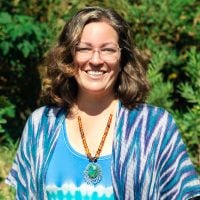Letting the last breath come.
Letting the last breath go.
Dissolving, dissolving into vast space,
the light body released from its heavier form.
A sense of connectedness with all that is,
all sense of separation dissolved
in the vastness of being.
Each breath melting into space
as though it were the last.
– Stephen Levine
I sat by my maternal grandmother’s deathbed on the Saturday after Thanksgiving.
She started dying 14 years ago, immediately after the death of my grandpa, her beloved husband whom she adored and followed around the world — raising their three children in Guam and Puerto Rico, as well as in several US cities — wherever his Air Force career took them. High school sweethearts, at the time of his death, they’d been married for sixty years. When he died, after a few painful years of Parkinson’s disease, dementia and ultimately lung cancer, she seemed to lose her will to live.
My aunt, daughter and I sat by her bedside, where she lay breathing lightly and barely opening her eyes. Together, we chanted Om Mani Padme Hum and then I sang the Warrior Seed Syllables. She seemed to react to the sacred sounds. She seemed to want to move but no longer had the strength to sit up.
I was only able to do this little Tibetan-Buddhist-inspired ritual because my own parents hadn’t yet arrived. It would have been absolutely scandalous and nearly impossible with my devout Catholic mother present.
Since I encountered yoga and the dharma, these Eastern teachings have resonated with me so much more than Christianity ever did. In fact, I left the Catholic Church at age ten and never looked back, to my mom’s dismay. I never could get on board with all the talk of saints, sin and salvation. The image of the gaunt, pale Jesus with a crown of thorns hanging on the crucifix was not appealing to me.
I cheerfully went along with First Communion but drew the line at Confession, flat out refusing to participate in the sacrament. I continued being dragged along to the dreadful hour of Mass on most but not all Sundays until I moved out on my own.
Now, love is my religion and writing, yoga and mindfulness are my daily sacraments.
Grandma’s dementia set in slowly. I remember my heart breaking as she told me probably ten years ago that she was conscious of losing her memory and expressed her powerlessness to hold on to her mind’s clarity.
A few years ago, it reached the point where she no longer knew our names or relationships to her. Nevertheless, I could always sense a recognition in her eyes when I’d visit. Two years ago, on my Colombian husband’s first visit to the States, he spontaneously salsa danced with my grandma in her kitchen in San Antonio. One year ago, she had reverted deeper into Benjamin-Button-like elderly childhood. She was right at the level of my then four-year-old daughter, watching cartoons, playing with stuffed animals and reading board books for young children.
This year, finally, her physical decline met with her mental decline.
On the Sunday after Thanksgiving, I went back for one last visit. I stood by my grandma’s side and stroked her hand and gazed at her with love and sorrow. This was a moment I’d been dreading since childhood, when every time I would say goodbye to my grandparents, I would irrationally worry that they would die and doubt that I would ever see them again.
It was a blessing to be with her for those moments, to say a proper goodbye, which I know she did hear on some level.
My abuelita passed away peacefully at age ninety-five on the last Tuesday morning of November. I received the news while we were on our way to the airport to fly to South America and visit my husband’s family for the holidays. It was a relief to know that she had at long last left behind all pain and suffering.
I took time to cry, grieve and process in the comforting anonymity of the airports and planes that day. It’s hard to believe I will never see her again, no return to the house where she had lived since before I was born.
On December 1, I plunged into the chaos that is my husband’s family. A loud, rambunctious, loving, carnivorous bunch we hadn’t seen for over four years. My mother-in-law can be pretty intense and challenging. She flips out about anything and everything, raising her voice, insulting and placing blame on anyone and everyone in the vicinity.
The truth is, my late grandmother used to be like her, prior to the Alzheimer’s. Both women lost their mothers to untimely deaths as young children. That deep sense of unjust abandonment is unimaginable to anyone who grew up with their mother.
My grandma became incredibly sweet and loving as she lost her memory. She let go of all the grudges and anxieties that she’d once harbored and became purely loving, always holding and kissing our hands and saying, “we love you.”
Grandma: I’m sorry; please forgive me; I love you; thank you.
What shall we do before we die, then?
Live fully. Love deeply. Let go of petty complaints and silly dramas that matter, ultimately, not at all. Express ourselves, use our voices. Be grateful, present, compassionate and kind.
Above all, always remember: no matter what, every day is a holy day.


 Share on bsky
Share on bsky




Read 0 comments and reply